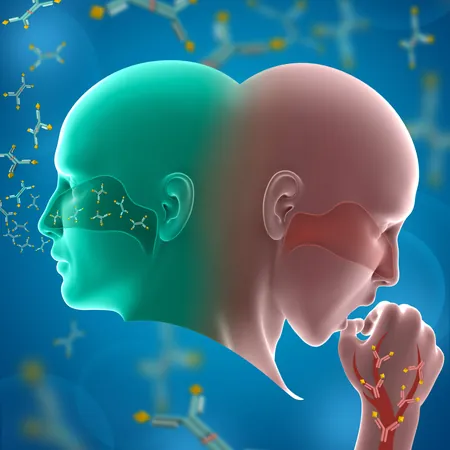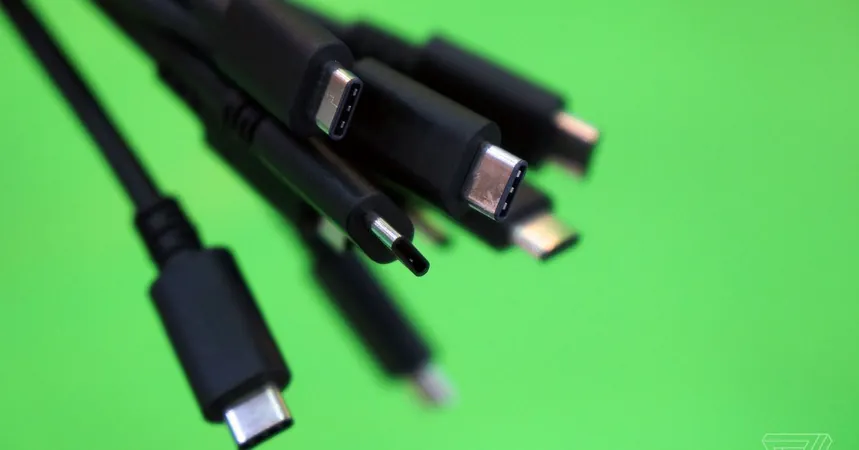
Nasal Swab Tests: A Game-Changer in Predicting COVID-19 Severity!
2024-11-06
Author: Nur
Introduction
In the ever-evolving landscape of COVID-19 research, a groundbreaking study from Emory University reveals that nasal swab tests could hold the key to predicting the severity of COVID-19 infections. This research sheds light on the role of autoantibodies found specifically in the nasal cavity, offering a more personalized approach to COVID-19 treatment.
Study Overview
While most strains of COVID-19 have been reported to cause milder symptoms, individuals with underlying health conditions remain at a significantly increased risk for severe illness. The study, published in *Science Translational Medicine*, followed 125 patients over nearly two years, documenting their immune responses as they experienced various levels of COVID-19 severity—from mild to critically ill.
Key Findings
The researchers discovered that more than 70% of participants with mild or moderate COVID-19 exhibited certain autoantibodies in their nasal passages. Surprisingly, these autoantibodies were linked to fewer symptoms, enhanced antiviral immunity, and rapid recovery. This finding suggests that the presence of these antibodies could play a protective role, helping regulate the immune response and reduce harmful inflammation.
Expert Insights
Eliver Ghosn, the senior author and an associate professor at Emory, emphasized the uniqueness of these findings. “Typically, autoantibodies are associated with increased inflammation and poorer health outcomes. However, in the context of COVID-19, our results indicate that nasal autoantibodies can actually mitigate the severity of the disease,” he stated. Instead of linking these antibodies to adverse reactions, the research shows they appear shortly after infection, potentially preventing complications by targeting an inflammatory molecule produced by infected cells.
Implications of the Study
Importantly, this study diverges from previous research that concentrated strictly on blood-borne autoantibodies, which have been correlated with heightened risk for severe disease. Ghosn explained, “Our focus on the actual site of infection—the nasal cavity—has provided insights into how localized immune responses can dictate outcomes. This could alter our understanding of disease severity.”
Innovative Approach with FlowBEAT
In the pursuit of precision diagnostics, the research team introduced FlowBEAT, a pioneering tool developed to enhance the measurement of antibodies in nasal samples. This innovative technology allows for a simultaneous assessment of multiple antibodies, improving sensitivity and efficiency. Ghosn remarked, “With FlowBEAT, we can evaluate nasal swabs in a dynamic way, potentially predicting symptom severity in real-time. This capability could revolutionize how we diagnose and treat respiratory infections.”
Future Directions
The implications of this research extend beyond COVID-19. The team aims to explore whether this protective nasal autoantibody response is an essential mechanism for combating other respiratory infections, such as influenza and RSV. “If confirmed, this could indicate a paradigm shift in our approach to understanding immune protection against viral infections,” Ghosn noted.
Conclusion
Currently, the Ghosn Lab is collaborating with Emory’s patent office to develop a predictive diagnostic tool utilizing standard nasal swab samples typically used in COVID-19 testing. Ph.D. candidate Ben Babcock, who led the study, expressed optimism about future applications: “Imagine real-time capture of immune responses in clinical settings—a timely, proactive approach that could empower both physicians and patients in making critical treatment decisions.”
Final Thoughts
As researchers continue to chase the evolving dynamics of COVID-19 and other respiratory viruses, the potential for nasal autoantibodies to guide treatment strategies could indeed transform patient care. Stay tuned as we uncover more about this transformative advancement in respiratory health!




 Brasil (PT)
Brasil (PT)
 Canada (EN)
Canada (EN)
 Chile (ES)
Chile (ES)
 España (ES)
España (ES)
 France (FR)
France (FR)
 Hong Kong (EN)
Hong Kong (EN)
 Italia (IT)
Italia (IT)
 日本 (JA)
日本 (JA)
 Magyarország (HU)
Magyarország (HU)
 Norge (NO)
Norge (NO)
 Polska (PL)
Polska (PL)
 Schweiz (DE)
Schweiz (DE)
 Singapore (EN)
Singapore (EN)
 Sverige (SV)
Sverige (SV)
 Suomi (FI)
Suomi (FI)
 Türkiye (TR)
Türkiye (TR)